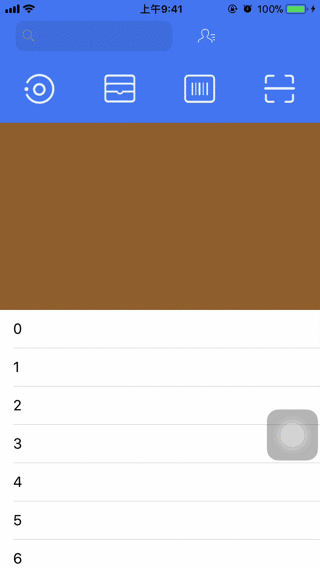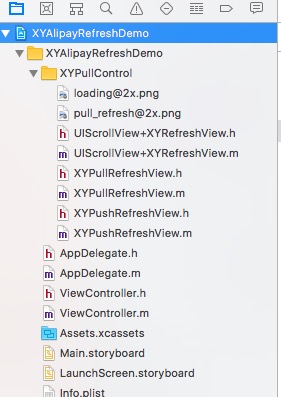XYAlipayRefreshDemo
运行效果

动画效果分析
1.UI需要变动,向上滑动的时候,顶部部分收缩。
2.右侧的滚动条的位置是从中间开始的,说明一个现象,这个tableview是从这里开始的。
3.tableview上面的view,是给tableview一起滑动,做到了无缝衔接。
4.滑动 tableview 上面那块 view ,直接响应滑动。
实现思路: 怎么解决以上四个效果问题,是本次的重点。经过多次的尝试分析得出,采用UIScrollView加UITableView的方式实现。从右侧滚动条开始的位置,上部分是个view,下部分是个UITableView。topView和UITableView作为UIScrollView的subView。
关键点分析
1.实现scrollView的代理方法scrollViewDidScroll,设置顶部topview的导航栏位置的视图的高度为KTopHeaderViewHeight。当scrollView的y轴偏移量大于0且小于KTopHeaderViewHeight时,计算出透明度的变化。
CGFloat alpha = (offsetY*2/KTopHeaderViewHeight>0) ? offsetY*2/KTopHeaderViewHeight:0;
if (alpha > 0.5) {
self.navNewView.alpha = alpha*2-1;
self.navView.alpha = 0;
} else {
self.navNewView.alpha = 0;
self.navView.alpha = 1-alpha*2;
}
self.topHeaderView.alpha = 1-alpha;
2.滚动条是从中部开始,也是从tableView的位置开始,因此设置scrollView的Indicator的显示位置。其中KTopViewHeight的高度是滚动条开始以上位置的高度,整个topView的高度。
_scrollView.scrollIndicatorInsets = UIEdgeInsetsMake(KTopViewHeight, 0, 0, 0);
3.scrollView和tableView同时具有滚动效果,当不做处理是,会出现滑动冲突。因此设置tableView的scrollEnabled为NO,解决滑动冲突。
_tableView.scrollEnabled = NO;
4.tableView作为scrollView的子视图,tableView的内容会随着刷新加载变化,为了正常的显示全部能容,需要监听tableView的contentSize,实时改变scrollView的contentSize
- (void)observeValueForKeyPath:(NSString *)keyPath ofObject:(id)object change:(NSDictionary<NSKeyValueChangeKey,id> *)change context:(void *)context {
if ([keyPath isEqualToString:@"contentSize"]) {
CGRect tFrame = self.tableView.frame;
tFrame.size.height = self.tableView.contentSize.height;
self.tableView.frame = tFrame;
self.scrollView.contentSize = CGSizeMake(0, self.tableView.contentSize.height+KTopViewHeight);
}
}
5.在顶部视图收缩时,页面滑动时,topView和tableView的相对ScrollView的位置在发生变化。因此在UIScrollView的代理里面改变topView和tableView的frame值。
- (void)scrollViewDidScroll:(UIScrollView *)scrollView {
CGFloat offsetY = self.scrollView.contentOffset.y;
if (offsetY <= 0.0) {
CGRect frame = self.topView.frame;
frame.origin.y = offsetY;
self.topView.frame = frame;
CGRect tFrame = self.tableView.frame;
tFrame.origin.y = offsetY + KTopViewHeight;
self.tableView.frame = tFrame;
if (![self.tableView isRefreshing]) {
self.tableView.contentOffset = CGPointMake(0, offsetY);
}
} else if (offsetY < KTopHeaderViewHeight && offsetY >0) {
CGFloat alpha = (offsetY*2/KTopHeaderViewHeight>0) ? offsetY*2/KTopHeaderViewHeight:0;
if (alpha > 0.5) {
self.navNewView.alpha = alpha*2-1;
self.navView.alpha = 0;
} else {
self.navNewView.alpha = 0;
self.navView.alpha = 1-alpha*2;
}
self.topHeaderView.alpha = 1-alpha;
}
}
注:下拉刷新控件是本人自己写的。可以替换成任意需要的控件,例如:MJRefresh,在相应的位置修改即可。
6、完整代码如下:
#import "ViewController.h"
#import "UIScrollView+XYRefreshView.h"
#define KScreenWidth [UIScreen mainScreen].bounds.size.width
#define KScreenHeight [UIScreen mainScreen].bounds.size.height
#define KTopViewHeight 300
#define KTopHeaderViewHeight 80
@interface ViewController ()<UITableViewDelegate,UITableViewDataSource,XYPullRefreshViewDelegate,XYPushRefreshViewDelegate>
@property (nonatomic, strong) UIScrollView *scrollView;
@property (nonatomic, strong) UITableView *tableView;
@property (nonatomic, strong) UIView *topView;
@property (nonatomic, strong) UIView *navBGView;
@property (nonatomic, strong) UIView *navView;
@property (nonatomic, strong) UIView *navNewView;
@property (nonatomic, strong) UIView *topHeaderView;
@property (nonatomic, assign) NSInteger dataCount;
@end
@implementation ViewController
- (void)dealloc {
[self removeObserver:self forKeyPath:@"contentSize"];
}
- (void)viewDidLoad {
[super viewDidLoad];
[self.view addSubview:self.navBGView];
[self.view addSubview:self.navView];
[self.view addSubview:self.navNewView];
[self.view addSubview:self.scrollView];
[self.scrollView addSubview:self.topView];
[self.scrollView addSubview:self.tableView];
//添加刷新控件
[self.tableView showPullRefreshViewWithDelegate:self];
[self.scrollView showPushRefreshViewWithDelegate:self];
[self.tableView addObserver:self forKeyPath:@"contentSize" options:NSKeyValueObservingOptionNew context:nil];
self.dataCount = 20;
}
//根据tableView的contentSize改变scrollView的contentSize大小
- (void)observeValueForKeyPath:(NSString *)keyPath ofObject:(id)object change:(NSDictionary<NSKeyValueChangeKey,id> *)change context:(void *)context {
if ([keyPath isEqualToString:@"contentSize"]) {
CGRect tFrame = self.tableView.frame;
tFrame.size.height = self.tableView.contentSize.height;
self.tableView.frame = tFrame;
self.scrollView.contentSize = CGSizeMake(0, self.tableView.contentSize.height+KTopViewHeight);
}
}
#pragma mark - XYPullRefreshViewDelegate
- (void)pullRefreshViewStartLoad:(XYPullRefreshView *)pullView {
dispatch_after(dispatch_time(DISPATCH_TIME_NOW, (int64_t)(2 * NSEC_PER_SEC)), dispatch_get_main_queue(), ^{
[pullView endRefreshing];
self.dataCount += 5;
[self.tableView reloadData];
});
}
- (void)pushRefreshViewStartLoad:(XYPushRefreshView *)pushView {
dispatch_after(dispatch_time(DISPATCH_TIME_NOW, (int64_t)(2 * NSEC_PER_SEC)), dispatch_get_main_queue(), ^{
[pushView endRefreshing];
self.dataCount += 5;
[self.tableView reloadData];
});
}
#pragma mark - UIScrollViewDelegate
- (void)scrollViewDidScroll:(UIScrollView *)scrollView {
CGFloat offsetY = self.scrollView.contentOffset.y;
if (offsetY <= 0.0) {
CGRect frame = self.topView.frame;
frame.origin.y = offsetY;
self.topView.frame = frame;
CGRect tFrame = self.tableView.frame;
tFrame.origin.y = offsetY + KTopViewHeight;
self.tableView.frame = tFrame;
if (![self.tableView isRefreshing]) {
self.tableView.contentOffset = CGPointMake(0, offsetY);
}
} else if (offsetY < KTopHeaderViewHeight && offsetY >0) {
CGFloat alpha = (offsetY*2/KTopHeaderViewHeight>0) ? offsetY*2/KTopHeaderViewHeight:0;
if (alpha > 0.5) {
self.navNewView.alpha = alpha*2-1;
self.navView.alpha = 0;
} else {
self.navNewView.alpha = 0;
self.navView.alpha = 1-alpha*2;
}
self.topHeaderView.alpha = 1-alpha;
}
}
- (void)scrollViewDidEndDragging:(UIScrollView *)scrollView willDecelerate:(BOOL)decelerate {
CGFloat offsetY = self.scrollView.contentOffset.y;
if (offsetY < - 60) {
[self.tableView startPullRefreshing];
}
}
#pragma mark - UITableViewDataSource
- (NSInteger)tableView:(UITableView *)tableView numberOfRowsInSection:(NSInteger)section {
return self.dataCount;
}
- (UITableViewCell *)tableView:(UITableView *)tableView cellForRowAtIndexPath:(NSIndexPath *)indexPath {
UITableViewCell *cell = [tableView dequeueReusableCellWithIdentifier:@"CELL"];
if (cell == nil) {
cell = [[UITableViewCell alloc] initWithStyle:UITableViewCellStyleDefault reuseIdentifier:@"CELL"];
}
cell.textLabel.text = [NSString stringWithFormat:@"%d",(int)indexPath.row];
return cell;
}
#pragma mark - getter && setter
- (UIScrollView *)scrollView {
if (_scrollView == nil) {
_scrollView = [[UIScrollView alloc] initWithFrame:CGRectMake(0, 64, KScreenWidth, KScreenHeight-64)];
_scrollView.delegate = self;
//Indicator的显示位置
_scrollView.scrollIndicatorInsets = UIEdgeInsetsMake(KTopViewHeight, 0, 0, 0);
_scrollView.contentSize = CGSizeMake(0, KScreenHeight*2);
}
return _scrollView;
}
- (UITableView *)tableView {
if (_tableView == nil) {
_tableView = [[UITableView alloc] initWithFrame:CGRectMake(0, KTopViewHeight, KScreenWidth, KScreenHeight*2-KTopViewHeight)];
_tableView.delegate = self;
_tableView.dataSource = self;
_tableView.scrollEnabled = NO;
}
return _tableView;
}
- (UIView *)topView {
if (_topView == nil) {
_topView = [[UIView alloc] initWithFrame:CGRectMake(0, 0, KScreenWidth, KTopViewHeight)];
_topView.backgroundColor = [UIColor colorWithRed:66/255.0 green:128/255.0 blue:240/255.0 alpha:1];
UIView *headerView = [[UIView alloc] initWithFrame:CGRectMake(0, 0, KScreenWidth, KTopHeaderViewHeight)];
headerView.backgroundColor = [UIColor colorWithRed:66/255.0 green:128/255.0 blue:240/255.0 alpha:1];
for (int i = 0; i<4; i++) {
UIButton *button = [[UIButton alloc] init];
[button setImage:[UIImage imageNamed:[NSString stringWithFormat:@"%d",i+1]] forState:UIControlStateNormal];
[headerView addSubview:button];
button.frame = CGRectMake((KScreenWidth/4)*i, 0, KScreenWidth/4, KTopHeaderViewHeight);
}
self.topHeaderView = headerView;
[_topView addSubview:headerView];
UIView *view = [[UIView alloc] initWithFrame:CGRectMake(0, KTopHeaderViewHeight, KScreenWidth, KTopViewHeight-KTopHeaderViewHeight)];
view.backgroundColor = [UIColor brownColor];
[_topView addSubview:view];
}
return _topView;
}
- (UIView *)navBGView {
if (_navBGView == nil) {
_navBGView = [[UIView alloc] initWithFrame:CGRectMake(0, 0, KScreenWidth, 64)];
_navBGView.backgroundColor = [UIColor colorWithRed:66/255.0 green:128/255.0 blue:240/255.0 alpha:1];
}
return _navBGView;
}
- (UIView *)navView {
if (_navView == nil) {
_navView = [[UIView alloc] initWithFrame:CGRectMake(0, 0, KScreenWidth, 64)];
_navView.backgroundColor = [UIColor clearColor];
UISearchBar *searchBar = [[UISearchBar alloc] initWithFrame:CGRectMake(10, 20, 200, 44)];
searchBar.backgroundImage = [[UIImage alloc] init];
UITextField *searchField = [searchBar valueForKey:@"searchField"];
if (searchField) {
[searchField setBackgroundColor:[UIColor colorWithRed:230/255 green:230/250 blue:230/250 alpha:0.1]];
}
[_navView addSubview:searchBar];
UIButton *button = [[UIButton alloc] initWithFrame:CGRectMake(220, 20, 44, 44)];
[button setImage:[UIImage imageNamed:@"contacts"] forState:UIControlStateNormal];
[_navView addSubview:button];
}
return _navView;
}
- (UIView *)navNewView {
if (_navNewView == nil) {
_navNewView = [[UIView alloc] initWithFrame:CGRectMake(0, 0, KScreenWidth, 64)];
_navNewView.backgroundColor = [UIColor clearColor];
UIButton *cameraBtn = [[UIButton alloc] initWithFrame:CGRectMake(10, 20, 44, 44)];
[cameraBtn setImage:[UIImage imageNamed:@"nav_camera"] forState:UIControlStateNormal];
[_navNewView addSubview:cameraBtn];
UIButton *payBtn = [[UIButton alloc] initWithFrame:CGRectMake(64, 20, 44, 44)];
[payBtn setImage:[UIImage imageNamed:@"nav_pay"] forState:UIControlStateNormal];
[_navNewView addSubview:payBtn];
UIButton *button = [[UIButton alloc] initWithFrame:CGRectMake(118, 20, 44, 44)];
[button setImage:[UIImage imageNamed:@"nav_scan"] forState:UIControlStateNormal];
[_navNewView addSubview:button];
_navNewView.alpha = 0;
}
return _navNewView;
}
@end
项目结构图

iOS仿支付宝首页的刷新布局效果
注:本文著作权归作者,由demo大师代发,拒绝转载,转载需要作者授权